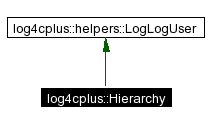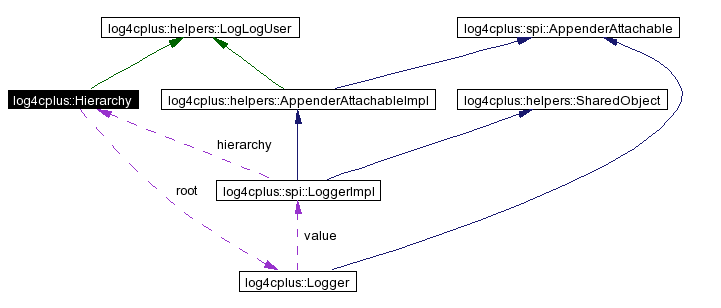
#include <hierarchy.h>
Inheritance diagram for log4cplus::Hierarchy:


Public Member Functions | |
| Hierarchy () | |
| Create a new Logger hierarchy. | |
| virtual | ~Hierarchy () |
| virtual void | clear () |
| This call will clear all logger definitions from the internal hashtable. | |
| virtual bool | exists (const log4cplus::tstring &name) |
Returns true if the named logger exists (in the default hierarchy). | |
| virtual void | disable (const log4cplus::tstring &loglevelStr) |
| Similar to disable(LogLevel) except that the LogLevel argument is given as a log4cplus::tstring. | |
| virtual void | disable (LogLevel ll) |
Disable all logging requests of LogLevel equal to or below the ll parameter p, for all loggers in this hierarchy. | |
| virtual void | disableAll () |
| Disable all logging requests regardless of logger and LogLevel. | |
| virtual void | disableDebug () |
| Disable all Debug logging requests regardless of logger. | |
| virtual void | disableInfo () |
| Disable all Info logging requests regardless of logger. | |
| virtual void | enableAll () |
| Undoes the effect of calling any of disable, disableAll, disableDebug and disableInfo methods. | |
| virtual Logger | getInstance (const log4cplus::tstring &name) |
| Return a new logger instance named as the first parameter using the default factory. | |
| virtual Logger | getInstance (const log4cplus::tstring &name, spi::LoggerFactory &factory) |
Return a new logger instance named as the first parameter using factory. | |
| virtual LoggerList | getCurrentLoggers () |
| Returns all the currently defined loggers in this hierarchy. | |
| virtual bool | isDisabled (int level) |
Is the LogLevel specified by level enabled? | |
| virtual Logger | getRoot () const |
| Get the root of this hierarchy. | |
| virtual void | resetConfiguration () |
| Reset all values contained in this hierarchy instance to their default. | |
| virtual void | setLoggerFactory (std::auto_ptr< spi::LoggerFactory > factory) |
| Set the default LoggerFactory instance. | |
| virtual spi::LoggerFactory * | getLoggerFactory () |
| Returns the default LoggerFactory instance. | |
| virtual void | shutdown () |
| Shutting down a hierarchy will safely close and remove all appenders in all loggers including the root logger. | |
Static Public Attributes | |
| const LogLevel | DISABLE_OFF |
| const LogLevel | DISABLE_OVERRIDE |
Friends | |
| class | log4cplus::spi::LoggerImpl |
| class | log4cplus::HierarchyLocker |
The casual user should not have to deal with this class directly. However, if you are in an environment where multiple applications run in the same process, then read on.
The structure of the logger hierarchy is maintained by the getInstance method. The hierarchy is such that children link to their parent but parents do not have any pointers to their children. Moreover, loggers can be instantiated in any order, in particular descendant before ancestor.
In case a descendant is created before a particular ancestor, then it creates a provision node for the ancestor and adds itself to the provision node. Other descendants of the same ancestor add themselves to the previously created provision node.
Definition at line 52 of file hierarchy.h.
|
|
Create a new Logger hierarchy.
|
|
|
|
|
|
This call will clear all logger definitions from the internal hashtable. Invoking this method will irrevocably mess up the logger hierarchy. You should really know what you are doing before invoking this method. |
|
|
Disable all logging requests of LogLevel equal to or below the ll parameter
Logging requests of higher LogLevel then Nevertheless, if the BasicConfigurator#DISABLE_OVERRIDE_KEY system property is set to "true" or any value other than "false", then logging requests are evaluated as usual, i.e. according to the Basic Selection Rule. The "disable" family of methods are there for speed. They allow printing methods such as debug, info, etc. to return immediately after an integer comparison without walking the logger hierarchy. In most modern computers an integer comparison is measured in nanoseconds where as a logger walk is measured in units of microseconds. |
|
|
Similar to disable(LogLevel) except that the LogLevel argument is given as a log4cplus::tstring.
|
|
|
Disable all logging requests regardless of logger and LogLevel. This method is equivalent to calling disable with the argument FATAL_LOG_LEVEL, the highest possible LogLevel. |
|
|
Disable all Debug logging requests regardless of logger. This method is equivalent to calling disable with the argument DEBUG_LOG_LEVEL. |
|
|
Disable all Info logging requests regardless of logger. This method is equivalent to calling disable with the argument INFO_LOG_LEVEL. |
|
|
Undoes the effect of calling any of disable, disableAll, disableDebug and disableInfo methods.
More precisely, invoking this method sets the Logger class internal variable called |
|
|
Returns
|
|
|
Returns all the currently defined loggers in this hierarchy. The root logger is not included in the returned list. |
|
||||||||||||
|
Return a new logger instance named as the first parameter using
If a logger of that name already exists, then it will be returned. Otherwise, a new logger will be instantiated by the
|
|
|
Return a new logger instance named as the first parameter using the default factory. If a logger of that name already exists, then it will be returned. Otherwise, a new logger will be instantiated and then linked with its existing ancestors as well as children.
|
|
|
Returns the default LoggerFactory instance.
Definition at line 212 of file hierarchy.h. |
|
|
Get the root of this hierarchy.
|
|
|
Is the LogLevel specified by
|
|
|
Reset all values contained in this hierarchy instance to their default.
This removes all appenders from all loggers, sets the LogLevel of all non-root loggers to Existing loggers are not removed. They are just reset. This method should be used sparingly and with care as it will block all logging until it is completed. |
|
|
Set the default LoggerFactory instance.
|
|
|
Shutting down a hierarchy will safely close and remove all appenders in all loggers including the root logger. Some appenders such as SocketAppender need to be closed before the application exits. Otherwise, pending logging events might be lost.
The |
|
|
Definition at line 305 of file hierarchy.h. |
|
|
Definition at line 304 of file hierarchy.h. |
|
|
Definition at line 56 of file hierarchy.h. |
|
|
Definition at line 57 of file hierarchy.h. |
 1.3.2
1.3.2